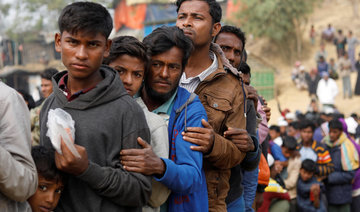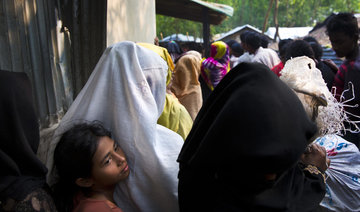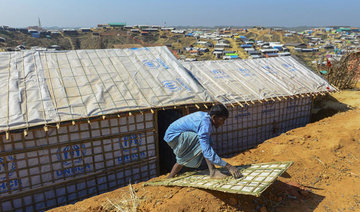COX’S BAZAR, Bangladesh: Bangladesh has counted more than a million Rohingya refugees living in camps near the border with Myanmar, higher than previous estimates, the head of its registration project said Wednesday as preparations for their return got under way.
The Bangladesh army began biometric registering of the refugees last year after the latest mass influx of Rohingya from Myanmar, where the Muslim minority have faced decades of persecution.
The registration is aimed partly at aiding repatriation of the refugees — a controversial issue as most say they do not want to return.
Bangladesh says it wants to start sending them home next week and has reached an initial agreement with Myanmar to complete the process within two years.
“So far we’ve registered 1,004,742 Rohingya. They are given biometric registration cards,” said Saidur Rahman, a brigadier general with the Bangladesh army who heads the Rohingya registration project.
Several thousand more have yet to be registered, he said.
The figures are higher than those provided by the UN, which estimates there are 962,000 Rohingya living in southeast Bangladesh, near the Myanmar border.
That includes the 655,000 the UN estimates have entered the country since August 25, when the Myanmar military launched a violent crackdown in Rakhine state following attacks by Rohingya militants.
Doctors Without Borders has said at least 6,700 Rohingya Muslims were killed in the first month of the crackdown.
Refugees in Bangladesh have alleged mass rape and widespread arson at the hands of soldiers and the Buddhist majority in Rakhine.
Some of the refugees have been living in Bangladesh for many years, but the repatriation agreement only covers those who have arrived since October 2016.
The two sides said on Tuesday they have agreed to complete the repatriation within a two-year period, the first concrete timeline given for the refugees’ return.
On Wednesday a Bangladesh official said thousands of Rohingya stranded in no man’s land since the latest violence erupted would be among the first to return under the agreement with Myanmar.
“What we’ve proposed to them is that they start with some 6,500 who have been stranded for a long time in no man’s land,” said the official, who asked not to be named.
Rights groups and the UN have expressed serious reservations about starting the process, particularly as Rohingya are still fleeing Rakhine.
There are also questions marks over where returning refugees would live after many of their homes were burned to the ground.
“With memories of rape, killing and torture still fresh in the minds of Rohingya refugees, plans for their return to Myanmar are alarmingly premature,” James Gomez, Amnesty International’s regional director for Southeast Asia and the Pacific, said on Tuesday.
“The obfuscation and denials of the Myanmar authorities give no reason to hope that the rights of returning Rohingya would be protected, or that the reasons for their original flight no longer exist.”
Over a million Rohingya refugees living in camps, Bangladesh says
Over a million Rohingya refugees living in camps, Bangladesh says














